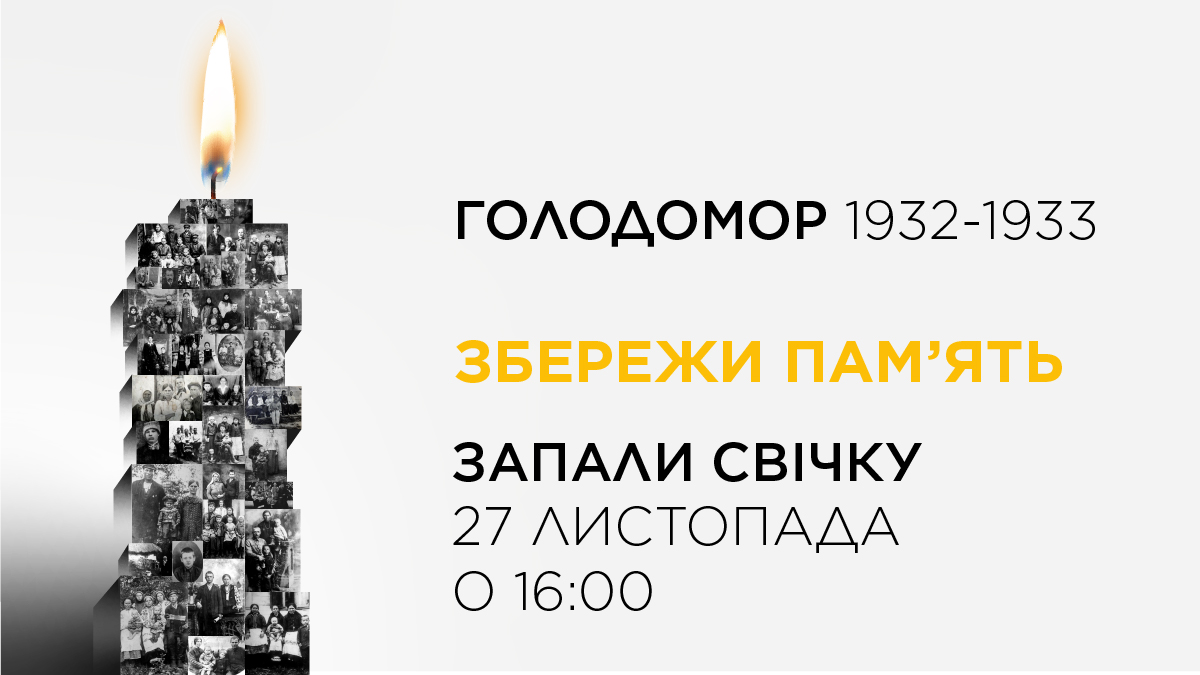Every year on the fourth Saturday of November, Ukraine commemorates the victims of the Holodomor of 1932–1933 and the mass artificial famines of 1921–1923 and 1946–1947.
In 2021, Holodomor Remembrance Day falls on November 27.
Ukraine lost millions of lives as a result of the genocide of 1932–1933, the mass artificial famines of 1921–1923, and 1946–1947. In 2006, the Holodomor of 1932–1933 was recognized by the Law of Ukraine as genocide of the Ukrainian people. In 2010, the Kyiv Court of Appeal found those guilty of organizing the Holodomor and qualified the Holodomor of 1932–1933 as an act of genocide by a part of the Ukrainian national group.
According to the UN Convention on the Prevention and Punishment of the Crime of Genocide, genocide is intentional acts aimed at the total or partial destruction of national, ethnic, racial or religious groups by killing members of that group; inflicting severe bodily or mental injuries on them; deliberate creation of living conditions designed for complete or partial destruction of the group; actions designed to prevent the birth of children in the group; forcible transfer of children of this group to another group.
The genocide of Ukrainians was carefully planned and organized by Stalin and his entourage. Numerous mechanisms were used to implement it: due to extremely high taxes and fees, unrealistic grain procurement plans and searches, food was confiscated from Ukrainian peasants, a ban on leaving the settlement from November 1932 (the so-called “blackboard” regime) and the famine-ridden republic in general. In 1933, they were deprived of their last hopes of salvation.
Purpose: to eliminate the national liberation movement and prevent the restoration of the Ukrainian state. The conquest of the famine became an instrument of consolidating the power of the Stalinist regime, liquidating the Ukrainian peasantry and turning them into disenfranchised collective farmers, and at the same time eradicating the social basis of the Ukrainian nation in Ukraine.
The USSR concealed and denied any evidence of the mass extermination of Ukrainians, but was unable to conceal the truth about the scale of the crime of genocide. The communist regime’s repressive policy of concealing the truth about the crime of genocide and destroying historical memory has further traumatized the Ukrainian nation.
The genocide led to the fear of Ukrainians being destroyed for manifestations of Ukrainianness and caused the deformation of Ukrainian identity.
The fear of telling the truth about the Holodomor, being a Ukrainian, prolonged depression, the desire to forget everything that happened, led to the loss of individual and collective memory, the historical truth about the crime of genocide and the historical collective trauma of the Ukrainian nation. Descendants of the victims suffered the trauma of genocide – one of the most severe among other types of collective trauma.
The Holodomor killed millions of Ukrainians in Ukraine and the Kuban, dealt an irreparable blow to mentality and culture, and severed generations. Children became the most vulnerable category of Holodomor victims. According to research by Ukrainian demographers, more than 1.5 million boys and girls under the age of 10 died at that time.
The moral duty of the state and society to past and future generations is to remember everyone who died of starvation and to pass on the memory of this tragedy.
At 16.00 on November 27, 2021, do not forget to join together in the national minute of silence.
